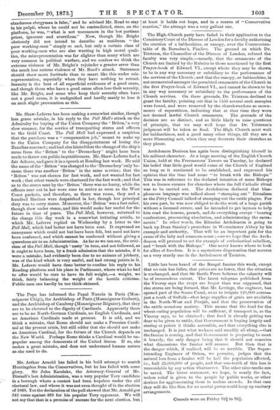Little has been heard of the Bengal famine this week,
except that no rain has fallen, that prices are no lower, that the situation is unchanged, and that Sir Bartle Frere believes the calamity will be of tremendous extent. The latest telegram published from the Viceroy says the crops are larger than was supposed, that rice stores are being formed, that Mr. Levinge, the engineer, has opened part of the Soane Canal, so as to irrigate 120,000 acres— just a tenth of Suffolk—that large supplies of grain are available in the North-West and Punjab, and that the preservation of the cattle occasions anxiety. This means that the food for the wheat-eating population will be sufficient, if transport is, as the Viceroy says, to be obtained ; that food is already getting too dear to be given to cattle, that Government is buying largely and storing at points it thinks accessible, and that everything else is unchanged. It is just what we have said steadily all along,—that the famine is coming, and that Government is preparing to meet it bravely, the only danger being that it should not conceive what dimensions the famine will assume. But then that is the danger which, if realised, will be so terrible. The Super- intending Engineer of Orissa, we perceive, judges that the natural loss from a famine will be half the population affected, i.e., half 25,000,000 of people, and that one-tenth of this loss is unavoidable by any action whatsoever. The other nine-tenths can be saved. The latter statement, we hope, is nearly the fact, unless relief is given to the people by public works, or other devices for agglomerating them in useless crowds. In that case they will die like flies, for no mortal power could keep up sanitary arrangements.










































 Previous page
Previous page